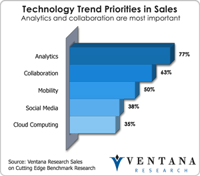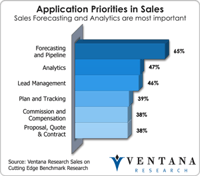Most people in business management admit that sales is more an art than a science. Organizations have long struggled to find the right mix to improve its effectiveness, and few get the most out of available technology. For many the default is still to use sales force automation (SFA) and spreadsheets to manage processes and try to increase the productivity of sales staff. In our view they should take a holistic approach to sales processes from contact to close and support everything from sales...
Read More
Topics:
Sales,
Operational Performance Management (OPM),
Recurring Revenue,
Sales Compensation,
Sales Forecasting,
Business Collaboration,
Business Mobility,
Cloud Computing,
CRM,
Customer Performance Management (CPM),
SFA
Sales forecasting is an essential process for most businesses. It helps guide the efforts not only of the sales function but also of finance, operations, manufacturing and customer service. Our recently released sales forecasting benchmark research reveals significant insights and best practices that can help companies optimize the effectiveness of this process. I recently wrote that most sales organizations need to make significant changes to the way they do sales forecasting. In that analyst...
Read More
Topics:
Sales,
Operational Performance Management (OPM),
Sales Forecasting,
Business Analytics,
Business Intelligence,
Cloud Computing,
Information Applications (IA),
Sales Performance Management (SPM),
SFA
In today’s highly competitive sales environment, where success depends on meeting the specific needs of buyers, an accurate and timely sales forecast is a critical tool for optimizing business outcomes. I discussed this as part of our 2014 research agenda for sales, noting that linking the forecast to commissions, quotas and territories is a requirement for success. We recently completed new benchmark research on sales forecasting to ascertain the state of the processes and technology sales...
Read More
Topics:
Big Data,
Sales,
Operational Performance Management (OPM),
Sales Forecasting,
Sales Operations,
Business Analytics,
Business Collaboration,
Business Intelligence,
Cloud Computing,
Business Performance Management (BPM),
Customer Performance Management (CPM),
Financial Performance Management (FPM),
Information Applications (IA),
Information Management (IM),
Sales Performance Management (SPM),
SFA,
Supply Chain Performance Management (SCPM)
Most organizations see improving the effectiveness of sales as a way to increase productivity. Those organizations that take advantage of the latest sales applications and technology are finding themselves with a competitive advantage, but many organizations lack the time and resources to assess and deploy appropriate platforms. That’s a shame, since most sales organizations have plenty to improve in their selling, forecasting, incentives and planning according to our latest research on sales...
Read More
Topics:
Big Data,
Sales,
Social Media,
Marketing,
Operational Performance Management (OPM),
PIM,
Sales Compensation,
Sales Forecasting,
Business Analytics,
Business Collaboration,
Business Intelligence,
Cloud Computing,
Governance, Risk & Compliance (GRC),
Business Performance Management (BPM),
CPQ,
CRM,
Customer Performance Management (CPM),
Financial Performance Management (FPM),
Information Applications (IA),
Information Management (IM),
Product Information Management,
Sales Performance Management (SPM),
SFA,
Workforce Performance Management (WPM)
It’s clear that sales organizations need to be efficient, but many are unaware of critical applications they could deploy to establish sales excellence. In my recent analysis, “Sales Organizations Need a Swift Technology Kick”, I outlined why sales departments have to look beyond using sales force automation (SFA) and spreadsheets andexamine dedicated applications for improving productivity and effectiveness. Our benchmark research in sales applications found a new set of application priorities...
Read More
Topics:
Big Data,
Sales,
Social Media,
Sustainability,
Operational Performance Management (OPM),
Sales Forecasting,
Business Analytics,
Business Collaboration,
Business Mobility,
Cloud Computing,
Governance, Risk & Compliance (GRC),
Location Intelligence,
Operational Intelligence,
Business Performance Management (BPM),
Customer Performance Management (CPM),
Financial Performance Management (FPM),
Information Applications (IA),
Information Management (IM),
IT Performance Management (ITPM),
Sales Performance Management (SPM),
SFA,
Supply Chain Performance Management (SCPM),
Workforce Performance Management (WPM)
If you want to hit the booking and revenue targets required to operate a business, you have to manage your sales forecast and pipeline. Optimally you should be able to monitor and act upon them any day of the week and make adjustments whenever you need to. Unfortunately, most organizations have to wait until they finish their manual efforts at the end of the month or quarter, or they miss critical changes in deals and behavior because they rely only on reporting from their sales force...
Read More
Topics:
Sales,
Salesforce.com,
Social Media,
Marketing,
Operational Performance Management (OPM),
Revenue Performance,
Sales Force Automation,
Sales Forecasting,
Sales Operations,
Business Analytics,
Business Collaboration,
Business Mobility,
Cloud Computing,
Business Performance Management (BPM),
CFO,
Cloud9 Analytics,
CMO,
CRM,
Customer Performance Management (CPM),
Financial Performance Management (FPM),
Sales Performance Management,
Sales Performance Management (SPM),
SFA,
Workforce Performance Management (WPM)
At the SAPPHIRE NOW conference this week, SAP released the production version of the cloud-based Sales OnDemand software that it unveiled earlier in the year. There has been a lot of the esoteric commentary of SAP Sales OnDemand from those that exclusively cover the IT industry. Unfortunately the majority of them have never worked in sales or held a quota that prevents a provide a deeper perspective on the relevance to the sales organization and what it can provide to existing SAP customers or...
Read More
Topics:
Sales,
SAP,
Social Media,
Sales Compensation,
Sales Force Automation,
Sales Forecasting,
Business Analytics,
Business Collaboration,
Business Intelligence,
Business Mobility,
Cloud Computing,
Governance, Risk & Compliance (GRC),
Location Intelligence,
Business Performance Management (BPM),
CRM,
Customer Performance Management (CPM),
Financial Performance Management (FPM),
Information Applications (IA),
Information Management (IM),
Sales Performance Management,
Sales Performance Management (SPM),
SFA
















